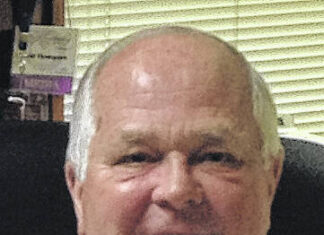LOUISVILLE — A man convicted of robbing the Security Bank and Trust Company in Maysville, in April 2002 has had his prison sentence upheld by the U.S. 6th Circuit Court of Appeals.
According to news reports, the federal appeals court upheld a 22-year prison sentence for Roger Clayton White for his role as the getaway driver in the robbery. He was convicted by a jury in August 2003 in U.S. District Court.
The court issued its ruling on the appeal on Dec. 24, noting the evidence allowed the sentence to be nearly tripled to 22 years in prison. In a 9-6 vote, the court called it legal because the final sentence didn’t go beyond the maximum recommended sentence.
Roger White, now 47, of Ironton, Ohio, was acquitted on charges of using a gun during the robbery, but convicted for bank robbery.
However, U.S. District Judge David Bunning added the extra 14 years to the sentence based on the gun charges, according to news reports.
An accomplice in the robbery, Laurie Ann Fischer, now 48, of El Paso, Texas, was also convicted on multiple counts of bank robbery and using a hand gun and was sentenced to 25 years in prison.
Roger Clayton White’s brother, Jeffrey Craig White of Fort Carson, Col., was also involved in the robbery but died of a self-inflicted gun shot wound after a high-speed chase with the Maysville Police Department.
At the time, police said Fischer and Jeffrey Craig White entered the Security Bank and Trust branch on U.S. 68 Wednesday, April 17, both carrying a .357-caliber magnum firearm.
The pair left in a white Chevrolet Lumina driven by Roger White; police said Roger White was armed with a rifle.
Maysville officers spotted the vehicle on Maple Leaf Road and pursued it onto Kentucky 11 toward Fleming County. The Lumina drove through a roadblock near Lewisburg and proceeded toward Flemingsburg, with passenger Jeffrey White firing at police in pursuit, officers said.
The car ultimately crashed into a second roadblock near the Flemingsburg city limits staged by Flemingsburg police and Fleming County Sheriff’s Office, glancing off police vehicles parked in the roadway before crashing into a tractor-trailer.
According to news sources, the appeals court’s decision in White’s case is the latest in the ongoing battle over how federal judges deal with the federal sentencing guidelines and U.S. Supreme Court rulings over what those guidelines mean.
One attorney who specializes in sentencing law believes Clayton’s dilemma could lure the U.S. Supreme Court back into the federal sentencing debate.
“Hopefully, there’s another chapter to be written in this case,” said Mark Harris, a New York-based attorney who filed a friend-of-the-court brief on White’s behalf.
Harris said the current sentencing law “violates our internal sense of right and wrong” when it comes to the law.
“It just doesn’t seem to be consistent with fair play,” Harris said. “The basic idea here is you can be acquitted of a crime, but still sentenced as if you committed it.”
White appealed to the U.S. 6th Circuit, but lost that initial bid. He asked the full 15-member court to rehear the case, which produced the Christmas Eve ruling.
Judge Deborah Cook wrote for a nine-member majority that judges may consider facts they consider “more probable than not” in handing down a sentence, even if the jury didn’t find enough evidence to convict.
“White thus is not being ‘sentenced for acquitted conduct’ when White’s sentencing judge takes that conduct into account in determining a sentence for the crime for which White was convicted, as long as the sentence imposed falls within the prescribed law for convicted conduct,” Cook wrote.
Judge Gilbert Merritt, writing for the six dissenters, said there were two reasons White’s sentence shouldn’t have been increased, including that a judge essentially found him guilty of the gun charges, not a jury.
“Second, and more broadly, the use of acquitted conduct to punish is wrong as a matter of statutory and constitutional interpretation and violates both our common law heritage and common sense,” Merritt wrote.
The practice of using unproven charges to enhance a sentence is barred by nearly every state, but is permissible in federal courts. The U.S. Supreme Court dealt with a similar issue in 2005, ruling that considering acquitted conduct at doesn’t violate the Constitution’s prohibition against double-jeopardy. But, they didn’t take up the issue raised by White over whether a jury has the final say over what constituted criminal conduct in a case.
“It’s quite frequent that this happens,” Harris said. “It’s not always as dramatic as it is in this case. It’s kind of shocking.”
White’s attorney, Kevin Schad of Ohio, said the case will be appealed to the U.S. Supreme Court.
“I believe Americans would be shocked to hear that an acquittal means nothing in the federal system,” Schad said.
Kyle Edelen, a spokesman for the U.S. Attorney’s office in Lexington, which prosecuted White, did not return a Christmas Eve message seeking comment. The office was closed on Friday.
Harris said the case likely won’t end with the 6th Circuit’s opinion.
“The U.S. Supreme Court is going to have to address this, possibly even with this case,” Harris said.
But, unless or until it does, White will stay in the Forrest City Federal Correctional Institute in Forrest City, Ark. He’s eligible for release in 2021, when he’ll be 60-years-old.
EDITOR’S NOTE: The Associated Press contributed to this article.
Contact Marla Toncray at marla.toncray@lee.net or 606-564-9091, ext. 275.





